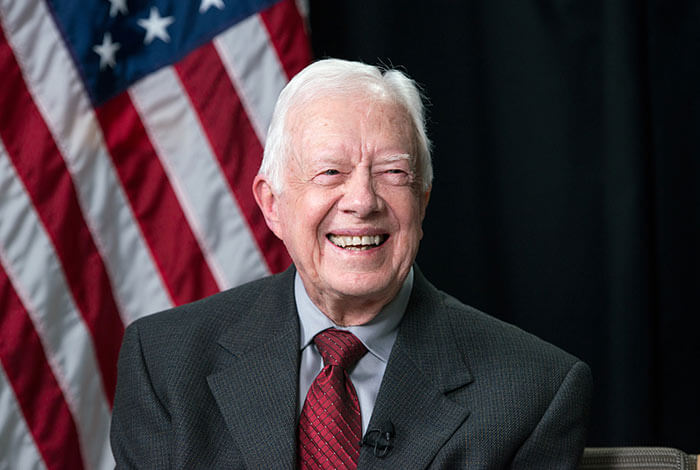| 1. | Introduction | 2. | Jimmy Carter: A Legacy of Leadership |
| 3. | The Significance of Carter’s Endorsement |
| 4. | Kamala Harris: The Candidate of Choice |
| 5. | Implications’s of Carter’s Support for Harris |
| 6. | FAQ: Frequently Asked Questions |
| 7. | Conclusion |
1. Introduction
In the ever-evolving landscape of American politics, few figures hold as much historical significance as Jimmy Carter. As the oldest living U.S. president, Carter’s long and distinguished career is marked not only by his time in the Oval Office but also by his ongoing influence and dedication to public service. In recent political news, Carter’s endorsement of Kamala Harris for the Democratic presidential nomination has captured the attention of many. His support for Harris, coupled with his remarkable longevity, offers a fascinating glimpse into the intersections of legacy, politics, and future leadership.
In this blog post, we’ll delve into the life and legacy of Jimmy Carter, explore his reasons for endorsing Kamala Harris, and examine what this endorsement might mean for the future of American politics. Let’s embark on this journey through history, politics, and the enduring spirit of one of America’s most respected leaders.
2. Jimmy Carter: A Legacy of Leadership
Jimmy Carter, born on October 1, 1924, in Plains, Georgia, has lived a life that has been both remarkable and transformative. His presidency from 1977 to 1981 was characterized by a focus on human rights, environmental issues, and energy policy. Even after leaving office, Carter continued to make an impact through his work with The Carter Center, which focuses on global health, democracy promotion, and conflict resolution.
As the oldest living U.S. president, Carter’s influence extends beyond his own presidency. His commitment to humanitarian efforts and his ability to remain relevant in contemporary politics make his opinions highly significant. Carter’s endorsement of Kamala Harris is not just a personal choice but a statement reflecting his values and vision for the future of the country.
3. The Significance of Carter's Endorsement

Jimmy Carter’s endorsement of Kamala Harris for the Democratic presidential nomination carries significant weight for several reasons. Firstly, Carter’s long-standing dedication to democratic principles and human rights aligns closely with Harris’s policy platforms. His support reinforces Harris’s credibility and highlights a continuity of values from one of the most respected figures in modern American politics.
Carter’s endorsement also represents a bridge between past and present. As someone who has witnessed decades of political change and development, Carter’s perspective on Harris offers a unique and valuable viewpoint. His endorsement serves as a powerful symbol of support from a figure who has navigated the complexities of American politics and can appreciate the significance of Harris’s candidacy.
4. Kamala Harris: The Candidate of Choice
Kamala Harris, the current Vice President of the United States, has carved out a distinguished career as a prosecutor, Senator, and now as the Vice President. Her candidacy for the Democratic presidential nomination reflects a commitment to progressive policies, including healthcare reform, climate action, and social justice. Harris’s background and experience make her a prominent candidate with a compelling vision for the future.
Carter’s support for Harris highlights his belief in her ability to lead the nation with the same dedication to service and integrity that characterized his own presidency. Harris’s policy positions and her approach to governance resonate with Carter’s principles, making her an ideal choice in his eyes.
5. Implication's of Carter's Support for Harris
Carter’s endorsement of Kamala Harris has several implications for the current political landscape. Firstly, it adds significant momentum to Harris’s campaign, particularly among Democratic voters who value Carter’s endorsement. His support may influence undecided voters and lend credibility to Harris’s candidacy.
Additionally, Carter’s endorsement reflects a broader trend of political figures using their influence to shape the direction of their parties. As the political climate evolves, endorsements from respected leaders like Carter can have a considerable impact on shaping electoral outcomes and guiding policy discussions.
6. FAQs: Frequently Asked Questions
Q: Why is Jimmy Carter considered the oldest living U.S. president?
A: Jimmy Carter, born on October 1, 1924, holds the title of the oldest living U.S. president due to his remarkable longevity. As of [current year], Carter is well into his late 90s, surpassing the age of any other living former presidents.
Q: What are some key accomplishments of Jimmy Carter’s presidency?
A: Jimmy Carter’s presidency is noted for its focus on human rights, energy policy, and environmental conservation. Major accomplishments include the Camp David Accords, the establishment of the Department of Energy, and significant work on energy efficiency.
Q: What are Kamala Harris’s main policy positions?
A: Kamala Harris’s key policy positions include expanding healthcare access, addressing climate change through green energy initiatives, and promoting social justice and criminal justice reform. Her approach aims to address both current challenges and long-term goals.
Q: How does Jimmy Carter’s endorsement impact Kamala Harris’s campaign?
A: Carter’s endorsement provides significant credibility and support to Kamala Harris’s campaign. It can influence undecided voters, bolster Harris’s standing within the Democratic Party, and highlight shared values and principles.
Q: What has been the reaction to Carter’s endorsement of Harris?
A: Reactions to Carter’s endorsement have been generally positive, with many viewing it as a significant and encouraging sign of support. It reinforces Harris’s credentials and may help her appeal to a broader electorate.
7. Conclusion
Jimmy Carter’s endorsement of Kamala Harris offers a profound insight into the intersection of history, politics, and future leadership. As the oldest living U.S. president, Carter’s support for Harris is more than just an endorsement—it’s a reflection of his enduring commitment to democratic values and his belief in the promise of new leadership. As we look ahead to the future, Carter’s influence and Harris’s candidacy represent a dynamic and evolving political landscape, one that is shaped by both historical legacy and forward-thinking vision.




